Gartner Alternatives for Supplier Evaluation


Evaluating your suppliers is important for selecting the best partners and assessing their performance over time.
Gartner, a leading research firm, is well-known for its supplier evaluations.
They do it through their Magic Quadrant and rank suppliers based on their ability to execute and completeness of vision.
Based on these two criteria, Gartner categorizes vendors into Leaders, Challengers, Visionaries, and Niche Players and helps you decide which suppliers you want to work with.
On the other hand, Gartner’s Critical Capabilities reports and Merlin—an automated supplier scorecard platform—evaluate suppliers’ product quality, support, pricing, technology, strategy, and corporate viability.
However, many feel Gartner favors larger vendors who pay subscriptions, often overlooking smaller, innovative suppliers.
This bias can leave gaps in your evaluation process and cause you to miss out on the best suppliers.
Additionally, Gartner’s tools can be quite expensive.
That’s why we’re introducing alternative tools for supplier evaluation that may be more tailored to your procurement needs.
To properly evaluate potential suppliers, you need accurate data.
And when it comes to data, our supplier data platform, Veridion, is a compelling alternative to Gartner.
With the help of AI and machine learning, Veridion scrapes data from across the Internet on a weekly basis and turns unstructured data into structured information about more than 115 million companies.
Source: Veridion on YouTube
This comprehensive data includes:
Why does this matter for supplier evaluation?
Within these 115 million companies, tens of millions are suppliers.
With access to over 60 data points per supplier, you get a comprehensive picture of their capabilities and performance, from products produced to sustainability and social policies.
Also, Veridion’s AI-powered data gathering ensures that smaller, potentially more innovative suppliers aren’t overlooked, unlike with Gartner.
This gives you a fuller view of the supplier landscape and each supplier’s profile, helping you find the perfect match.
How does it work?
You enter the criteria you want your supplier to meet into our supplier discovery portal or our search APIs, which easily integrate with your existing systems.
In seconds, you’ll receive a list of potential candidates. You can then dive deep and evaluate suppliers more thoroughly to find the perfect fit.
Check out how our supplier discovery works in the video below.
Source: Veridion on YouTube
Besides this, Veridion helps you assess and evaluate suppliers during your relationship with them.
With our Match & Enrich feature, you can keep your supplier master data up-to-date, and de-duplicated, ensuring you have accurate data on your suppliers.
Accurate data is key for effective supplier evaluation, as it allows you to better assess their performance, capabilities, and suitability for your needs.
And the best part?
Veridion can alert you about any changes in your suppliers’ activities, such as losing an important certification or a drop in production, so you can take action or find a more suitable supplier and reduce risks.

Source: Veridion
Interested in improving your supplier evaluation process with all these features without breaking the bank?
Contact us to find out more about Veridion’s cost-effective solutions.
If you’re looking for a powerful tool to evaluate suppliers, Kodiak Hub is definitely worth considering.
What sets Kodiak Hub apart is its easy-to-use suite of modules, especially its supplier evaluation software.
Like Gartner and Veridion, Kodiak Hub supports supplier evaluation throughout the discovery and sourcing phases, as well as during your ongoing relationship with suppliers.
With Kodiak Hub, potential suppliers can self-register, and the CRM will instantly update supplier profiles with data from multiple sources to give you a comprehensive view of each supplier in one place.
Below, you can see what exactly the supplier profile looks like:
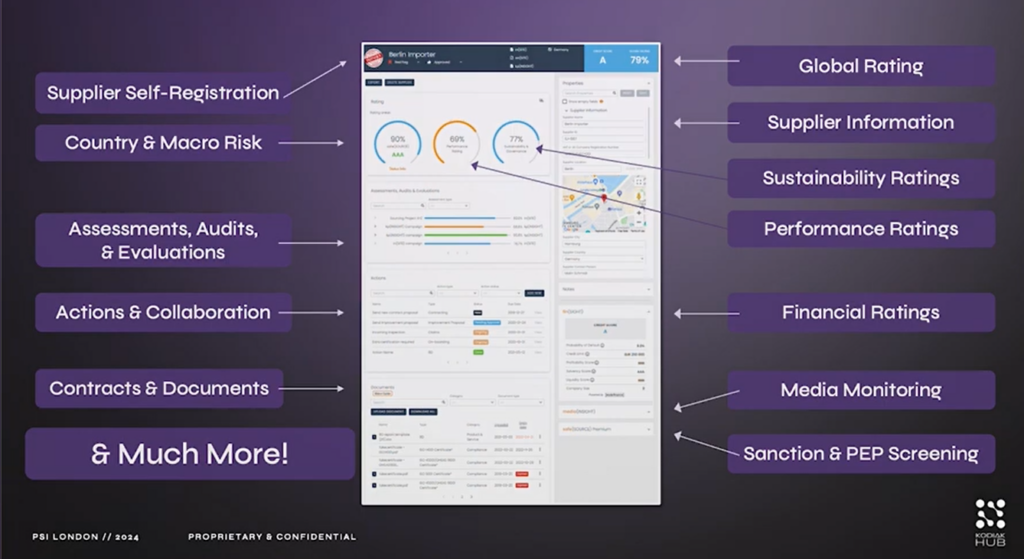
Source: Kodiak Hub on YouTube
For example, as soon as the supplier inputs its location, Kodiak Hub will add country-related risk data, so you know what you might be dealing with.
In fact, Kodiak Hub helps you identify potential risks early with data from 39 different indicators, including geopolitical, environmental, and financial risks.
One of the standout features is the dynamic supplier performance evaluation builder.
This drag-and-drop tool lets you quickly create custom supplier evaluations.
From their Out-of-the-Box Global Attribute Library, you can select performance attributes specific to your needs, whether for a particular segment, category, product, or project.
Kodiak Hub then automatically collects data from multiple sources, such as:
All this data is then aggregated and gives instant insight into supplier performance.
Pricing information isn’t disclosed upfront, but you can book a demo to see how Kodiak Hub works and get details on pricing.
You can also download their supplier performance monitoring and vendor assessment templates for free.
Tradogram is a cloud-based procurement management software that includes robust supplier management features.
It is also very helpful for supplier evaluation.

Source: Tradogram
With Tradogram, you can:
One very useful feature is the ability to set reminders for regular supplier performance reviews, ensuring your supplier evaluations are always up-to-date and consistent.
Tradogram also integrates seamlessly with accounting and ERP solutions, streamlining your workflows.
Pricing-wise, Tradogram offers a free basic plan with a one-user account. For more advanced features, the premium plan starts at $168 per month.
Overall, Tradogram provides detailed supplier profiles, automated procurement records, and customizable scorecards.
This ensures that you rely on accurate data rather than intuition, leading to better decision-making and improved supplier relationships.
MetricStream is a governance, risk management, and compliance solution that is a strong alternative to Gartner for supplier evaluation, particularly in assessing supplier risks.
Here’s why.
MetricStream has an intuitive portal where you can view detailed supplier profiles, including products, services, contracts, and risk ratings.
Suppliers can also update their information directly in the system.

Source: MetricStream
The platform streamlines the onboarding process by automating risk evaluations and integrating alerts from external sources to verify supplier information.
It continuously checks for “red flags,” assigns risk ratings, and triggers assessments based on predefined criteria.

Source: MetricStream
Key features include:
MetricStream also segments suppliers for consistent risk assessments using predefined questionnaires and ad-hoc evaluations.
It calculates and aggregates risk scores to provide an overall risk view.
Additionally, MetricStream tracks supplier performance with KPI scores using data from internal systems and external audits.
These scorecards help you monitor performance and identify potential issues early.
Pricing information is not readily available, so you should contact MetricStream directly if this tool sounds like it would fit your supplier evaluation needs.
SpendEdge is a market intelligence company that provides valuable insights to procurement professionals with data on markets, supply chains, commodities, prices, and supplier intelligence.
Similar to Gartner, SpendEdge categorizes suppliers into quadrants based on operational and functional capabilities.
Using advanced statistics, modeling techniques, and extensive data sets, SpendEdge predicts various supplier risks.
They assign risk scores based on probability and severity and provide detailed risk profiles for each supplier.
Key features of SpendEdge include:
In BizVibe, you can find potential suppliers based on metrics such as years of experience, revenue, and key productivity measures.
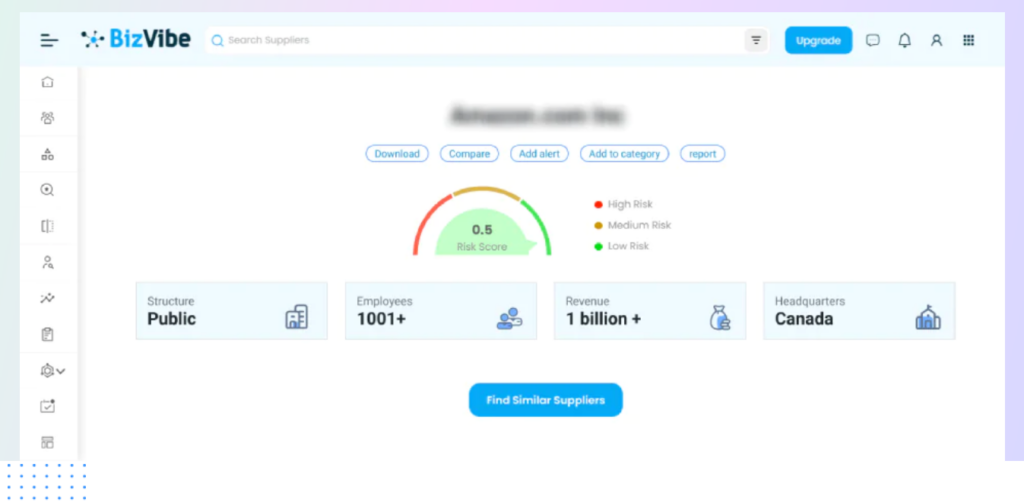
Source: SpendEdge
You can also track supplier news and financials and run RFI/RFP events with shortlisted suppliers.
However, compared to platforms like Veridion, which boasts over 115 million companies and offers more comprehensive search criteria, SpendEdge may not be as strong in this area.
SpendEdge does not provide pricing information upfront, but they offer a free trial if you’re interested in exploring this tool.
The next on our list is Aravo, a cloud-based tool that makes it easy to track and manage your suppliers’ performance.
Named a Leader in the 2021 Gartner Magic Quadrant for IT Vendor Risk Management Tools, Aravo’s key feature is robust supplier risk management.
However, Aravo has more features that can help you track performance and evaluate suppliers accordingly.
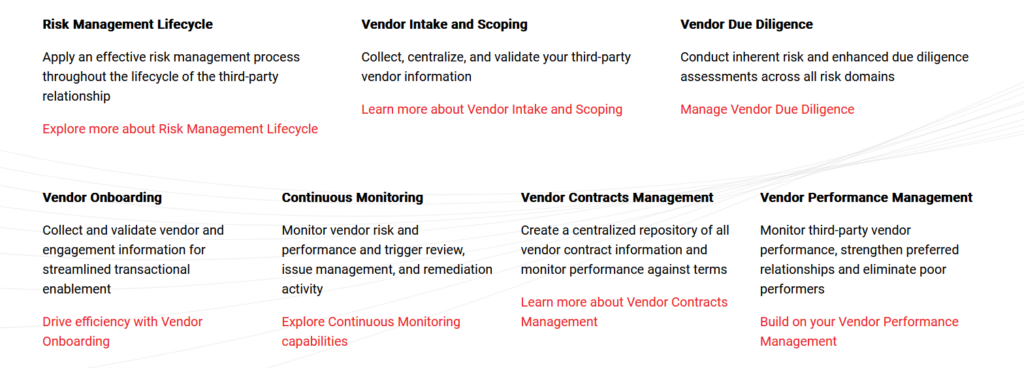
Source: Aravo
With Aravo, you can score your suppliers across various metrics and adjust how these scores are combined to get an overall performance rating.
This helps you clearly understand how well each supplier is doing.
Aravo is also pre-configured for multiple ESG frameworks, meaning the tool is already set up to help you assess suppliers according to ESG criteria, such as:
Below you can see what those scores look like.

Source: Aravo
On top of that, you can set up custom alerts for specific performance issues to stay informed about critical problems.
You can also use Aravo’s dashboards to quickly identify suppliers that need improvement and automatically initiate corrective actions based on performance criteria.
To see how Aravo can transform your supplier management, you can request a demo.
Our final alternative to Gartner is Online Procurement, a comprehensive e-procurement management software suite with strong supplier management features.
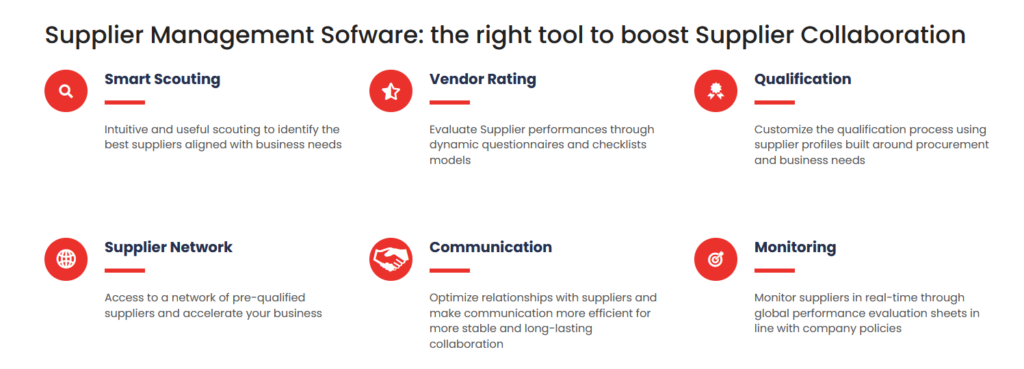
Source: Online Procurement
This tool connects you with a network of pre-qualified suppliers, making it easier to find those that align with your specific business needs.
However, when it comes to supplier evaluations, the standout feature is its vendor rating system.
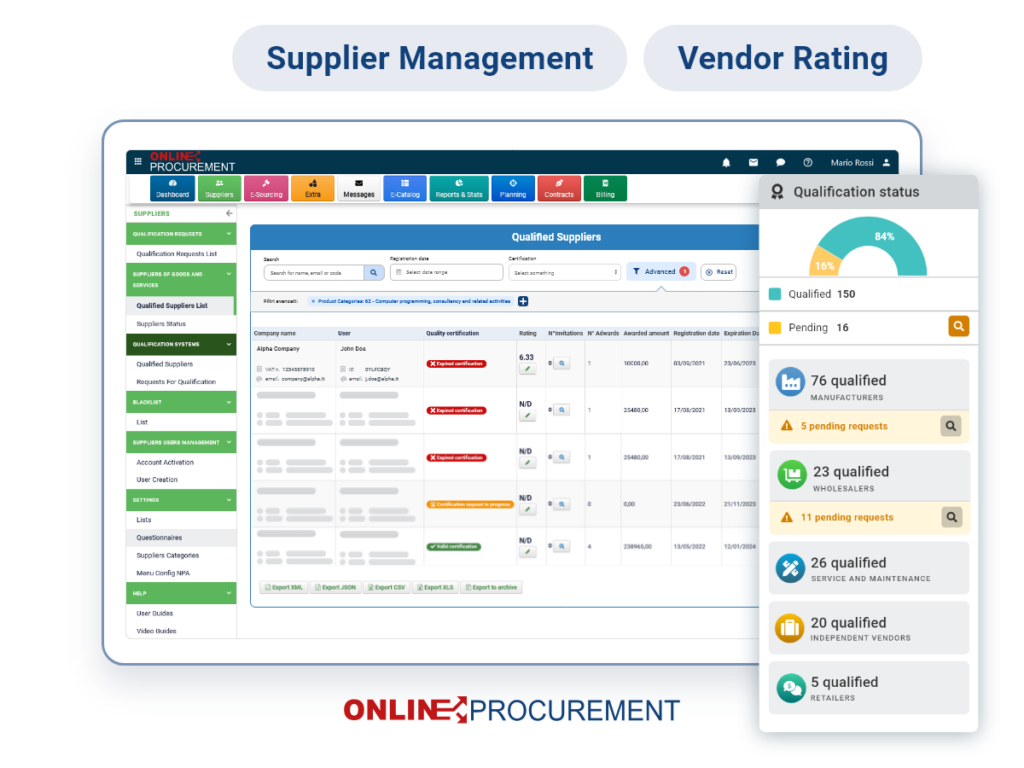
Source: GetApp
Essentially, with this tool, you can:
Also, for each step in the purchasing process (such as placing an order, receiving goods, or making a payment), the system can automatically recalculate and update supplier scores based on their performance and the quality of supplies in real time.
On top of that, you can blacklist the suppliers that do not comply and exclude them from future deals to mitigate risk.
The software also offers customizable interfaces, allowing you to use your company logo and color palette in the login page and adjust the back-end interface according to your preferences.
To get a closer look at how Online Procurement works and to discuss pricing, you can book a demo or contact them directly.
Gartner is a well-known name in supplier evaluation, but as you saw today, there are various tools available that might better suit your specific needs.
Effective supplier evaluation hinges on having accurate and comprehensive data.
Therefore, it’s important to choose a solution that automates data gathering and keeps all your supplier information in one place.
And, even better, alerts you about changes in your suppliers’ activities.
Many of the tools we’ve covered today excel in these areas, often providing more tailored solutions than Gartner.
So, take another look at these tools, do your own research, try out demos, and review their free materials.
You’re likely to find a better fit for your supplier evaluation needs among these options.
Best of luck!